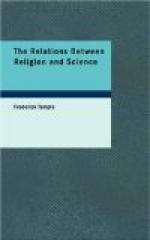But our present concern is not with Mathematics but with Physics. And here Kant fails altogether to convince; for, taking Time and the Perceptive Powers of the Understanding as parts of the human mind, he shows, what indeed is clearer and clearer every day, that the principles (so called) of Physics are indispensable Postulates, not indeed of observing with the senses, but of comprehending with the understanding, whatever happens. In order to give anything that can be called an explanation of any event we must show that it falls under the general rules which constitute the uniformity of Nature. We have no other meaning for the words understanding or explaining an event. Thinking, when analysed, is found to consist in bringing all that happens under universal laws, and no phenomenon can be said to be explained in thought except by being so related to all other phenomena. But it does not by any means follow that events cannot happen or cannot affect our senses without being susceptible of such explanation. To say that an event cannot be understood, and to say either that it cannot happen or that it cannot be observed by the senses, are two very different things. The fact is that Mathematics and Physics do not, as Kant assumes, present the same problem for solution, and do not therefore admit of one solution applicable to both. It is not the case that there is a science of abstract Physics corresponding to the science of Mathematics and sharing in the same character of necessity. In Mathematics we have truths which we cannot but accept, and accept as universal and necessary: in Physics we have no such truths, nor has Kant even endeavoured to prove that we have. The very question therefore that we are asked to solve in regard to Mathematics does not present itself in Physics. I am constrained to believe that two and two are four and not five; I am not constrained to believe that if one event is followed by another a great many times it will be so followed always. And the question is, why, without any constraint, I nevertheless so far believe it that I require special evidence in any given case to convince me to the contrary. And Kant’s answer is irrelevant. He says that we cannot think the sequence of events unless they fall under the postulates of thinking, that is, the postulates of science; but this is no answer to the question. Why do we believe that, unless the contrary be proved, everything that is observed by the senses is capable of being reduced under these postulates of thinking? The sequence of things cannot otherwise be explained; but why should the sequence of all things that happen be capable of being explained? The question therefore still remains unanswered. What right have we to assume this Uniformity in Nature? or, in other words, what right have we to assume that all phenomena in Nature, observed by our senses, are capable of being brought within the domain of Science? And to answer this question we must approach it from a different side.




